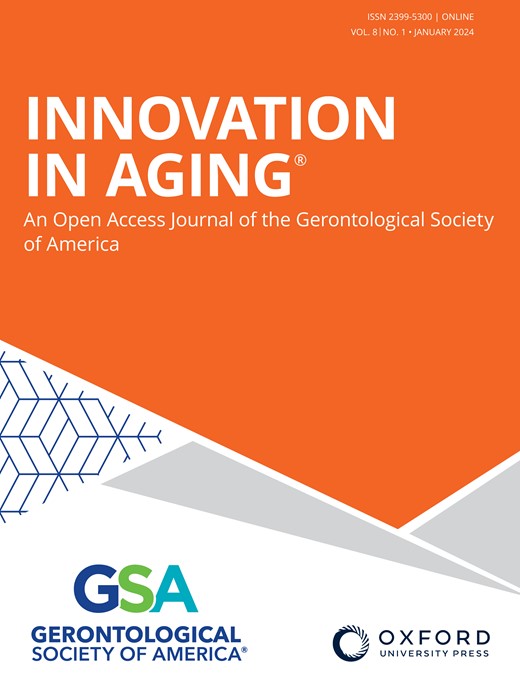ASSET-BASED COMMUNITY DEVELOPMENT FOR DEMENTIA-FRIENDLY COMMUNITIES (ABCD FOR DFC): A PILOT PROJECT IN HONG KONG
IF 4.9
3区 医学
Q1 GERIATRICS & GERONTOLOGY
引用次数: 0
Abstract
Abstract There is little understanding about how a dementia-friendly community can be constructed in East Asian societies, particularly in geographically remote areas characterized with majority older adult residents and limited external support. A pilot project using an asset-based community development (ABCD) approach in constructing a dementia-friendly community in Hong Kong was implemented. Informed by the theoretical tenets of ABCD, the purpose of this paper is to examine the effects of this pilot project in enabling older adult residents and other community stakeholders to better respond to challenges resulting from growing prevalence of dementia. Multiple stakeholder interviews were conducted with older adult residents, church leaders, district councillors, and social workers. Participants were asked to share the strengths and challenges of this ABCD pilot project in building a dementia-friendly community. Data generated from interviews were analyzed using thematic analysis. Four key preliminary themes were identified, including on the individual level: enhanced dementia literacy, and enacted proactive behaviour; and on the community level: strengthened bridging social capital, and improved community caring capacity. Uncertain long-term financial and professional support posed challenges to participants. Nevertheless, findings underscore the importance of departing from traditional service delivery models, to one that infuses ABCD approaches in constructing a dementia-friendly community. Mobilising existing human and social capital in the community, and embedding older adults in co-creating solutions are key to improve dementia-related interventions. We contribute to ongoing theoretical and practice discussions on the intersections between population aging and employing community-based solutions to create a more dementia-friendly society.以资产为本的社区发展促进老年痴呆症友好社区(ABCD for DFC):香港试点项目
摘要 人们对如何在东亚社会建设老年痴呆症友好社区知之甚少,尤其是在地理位置偏远、老年居民居多且外部支持有限的地区。在香港实施了一个试点项目,采用以资产为基础的社区发展(ABCD)方法来建设老年痴呆症友好社区。根据 ABCD 的理论原则,本文旨在研究该试点项目在帮助老年居民和其他社区利益相关者更好地应对老年痴呆症日益普遍所带来的挑战方面的效果。我们对老年居民、教会领袖、区议员和社工等多个利益相关者进行了访谈。我们要求参与者分享 ABCD 试点项目在建设老年痴呆症友好社区方面的优势和挑战。我们采用主题分析法对访谈中获得的数据进行了分析。初步确定了四个关键主题,包括在个人层面:提高对痴呆症的认识和采取积极主动的行为;在社区层面:加强连接社会资本和提高社区关怀能力。不确定的长期经济和专业支持给参与者带来了挑战。尽管如此,研究结果还是强调了摆脱传统服务提供模式的重要性,即在构建老年痴呆症友好型社区的过程中融入 ABCD 方法。调动社区现有的人力和社会资本,让老年人参与共同创造解决方案,是改善痴呆症相关干预措施的关键。我们将为正在进行的关于人口老龄化与采用基于社区的解决方案之间的交叉点的理论和实践讨论做出贡献,以创建一个对痴呆症更友好的社会。
本文章由计算机程序翻译,如有差异,请以英文原文为准。
求助全文
约1分钟内获得全文
求助全文
来源期刊

Innovation in Aging
GERIATRICS & GERONTOLOGY-
CiteScore
4.10
自引率
0.00%
发文量
72
审稿时长
15 weeks
期刊介绍:
Innovation in Aging, an interdisciplinary Open Access journal of the Gerontological Society of America (GSA), is dedicated to publishing innovative, conceptually robust, and methodologically rigorous research focused on aging and the life course. The journal aims to present studies with the potential to significantly enhance the health, functionality, and overall well-being of older adults by translating scientific insights into practical applications. Research published in the journal spans a variety of settings, including community, clinical, and laboratory contexts, with a clear emphasis on issues that are directly pertinent to aging and the dynamics of life over time. The content of the journal mirrors the diverse research interests of GSA members and encompasses a range of study types. These include the validation of new conceptual or theoretical models, assessments of factors impacting the health and well-being of older adults, evaluations of interventions and policies, the implementation of groundbreaking research methodologies, interdisciplinary research that adapts concepts and methods from other fields to aging studies, and the use of modeling and simulations to understand factors and processes influencing aging outcomes. The journal welcomes contributions from scholars across various disciplines, such as technology, engineering, architecture, economics, business, law, political science, public policy, education, public health, social and psychological sciences, biomedical and health sciences, and the humanities and arts, reflecting a holistic approach to advancing knowledge in gerontology.
 求助内容:
求助内容: 应助结果提醒方式:
应助结果提醒方式:


